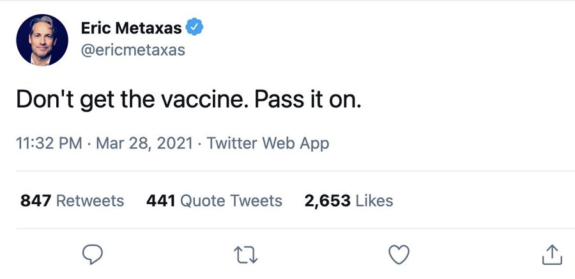Not only has Eric Metaxas become a conspiracy theorist when it comes to the 2020 presidential election, he apparently has gone full anti-vax.
I told you about his move into this world back in 2020. Now Metaxas is telling his followers not to get vaccinated.
Don’t get the vaccine. Pass it on.
— Eric Metaxas (@ericmetaxas) March 29, 2021
(Metaxas has removed the tweet, but below is a screen cap of it)
Hat tip to Joemygod for this. I am blocked by Metaxas so I didn’t see it.
In May 2020, Metaxas had Kent Heckenlively on his radio show and gave him a 36 minute commercial for the anti-vax movement. Heckenlively was allowed to provide a full recitation of the anti-vax catalog of false claims and half-truths. Now it seems Metaxas has fully sided with the fringe and may push some people over the anti-vax edge.
He just keeps finding the edge of the fringe and jumping off.
It’s not a vaccine. Pass it on. https://t.co/XyNCm5rNfH
— Eric Metaxas (@ericmetaxas) March 29, 2021
The article that Metaxas links to is not by a scientist or virologist but by a conspiracy writer. In it, he writes:
It [the vaccine] is not a vaccine. Vaccines are actually a legally defined term. And they’re a legally defined term under public health law. They’re a legally defined term under CDC and FDA standards, and a vaccine specifically has to stimulate, both an immunity within the person receiving it but it also has to disrupt transmission. And that’s not what this is.
Here is the CDC definition of a vaccine: “A product that stimulates a person’s immune system to produce immunity to a specific disease, protecting the person from that disease.”
While there is a question about transmission with these vaccines, these questions don’t render the vaccine not a vaccine. Past vaccination efforts have had inconsistent results when it comes to transmission immunity. See this Scientific American article for more on that topic.
This 2009 scientific virology paper casts doubt on the notion that transmission prevention is a requirement to be a vaccine:
The benefits of reducing person-to-person transmission in the context of either an epidemic or a pandemic are clear. It is therefore appropriate that one of the main aims of vaccination is to limit transmission. Nevertheless, the efficacy of vaccines in blocking viral spread, either to or from the vaccinated individual, is not traditionally assessed in preclinical or clinical trials.
Beneficial? Yes. Required or “traditionally assessed?” No.
David Dark asks Simon & Schuster a very good question.
.@simonschuster, could y'all rethink the decision to print Bonhoeffer's The Cost of Discipleship with Eric's foreword? I don't like the righteous witness of that book being tied to his. https://t.co/dOrcOrwY3X
— David Dark’s Media Voice (@DavidDark) March 29, 2021

